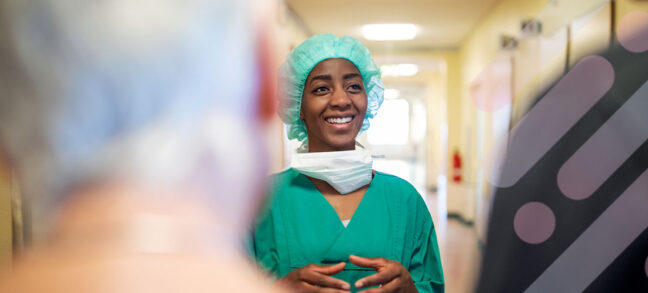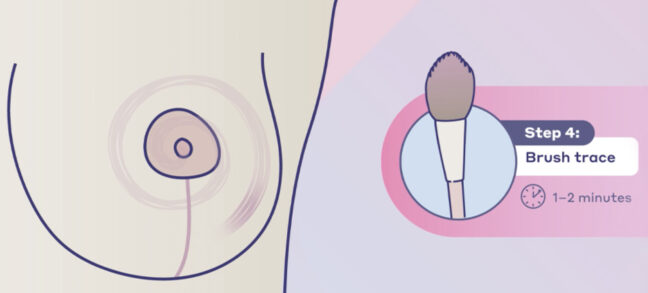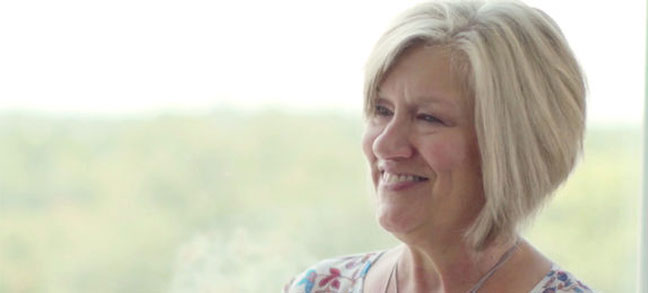an unexpected finding
Gwynne was religious about her yearly mammograms. She never missed one. Not even when there was a hurricane. So when her OB-GYN said they found something, she was surprised and scared.
After returning for a more extensive mammogram, an ultrasound and, eventually, a biopsy, doctors discovered that the “something” was cancer. From there, things moved quickly.
information overload
Gwynne was determined to gather as much information as she could. Her primary focus was making a plan to remove the cancer as soon as possible. Reconstruction was a secondary concern.
When she and her sister met with Dr. Ellsworth, a plastic surgeon recommended by her oncologist, her mind was crowded with questions—most of them centered around her cancer. It was a lot to take in. But when Dr. Ellsworth presented a variety of reconstruction options, it was free flap reconstruction and the Resensation® technique that stuck with her and her sister.
Free flap reconstruction uses a woman’s own tissue to recreate the breast, while Resensation reconnects the nerves in the newly reconstructed breast to potentially restore feeling. Gwynne and her sister agreed that it answered all of her concerns.
“That was the answer to every prayer I had. And I knew I wanted to talk to my oncologist about that at that time.”
Gwynne also appreciated that, unlike with implants, free flap reconstruction and Resensation meant she wouldn’t have to worry about potentially going through another surgery in a decade or so.
“I had been through all kinds of tests and pricked and prodded at that point. I wanted to get well and move forward. That was my whole focus.”
full speed ahead
Fortunately, Gwynne’s tumor was less than five centimeters. She was relieved to learn she wouldn’t need chemotherapy. She also had one of the most common forms of breast cancer, which meant her team knew a lot about it. They all agreed surgery was her best option.
Gwynne elected to do a double mastectomy. And since her cancer had not metastasized, her doctors could do everything at once—remove the tumor, as well as perform reconstruction and Resensation.
“Everything moved along rather quickly, and I went from diagnosis to probably four or five different tests to lymph node removal to the mastectomy and reconstruction in the blink of an eye.”
moving beyond
As Gwynne began to heal, her focus changed. She was ready to feel again, but she knew it wasn’t going to happen overnight. Regaining feeling is a gradual process. It wasn’t until a few months after her surgery, when she walked into a door jamb, that she realized she was starting to regain sensation.
“Once I started feeling more and more tingling and stuff like that, I was like, ‘Okay, this stuff is working now.’ And that was so gratifying because hugs are important in my life, and I could finally feel them again.
“… the fact that I can hurt myself now if I walk into something, I feel it, or if I hug someone, I feel it, or if something splatters on me hot, I feel that. I can feel those sensations now. And those are important.
“I often think about the fact that I had grandchildren before I had cancer. And so, I knew what a hug felt like. I knew what a kiss felt like. And so, I had all those feelings. And afterwards, when I didn’t have a lot of sensation and I couldn’t feel that, that was depressing. And I’m grateful now that I’m able to feel that. I don’t know what I would’ve done if that wouldn’t have come back.”
making others aware
Today, Gwynne’s focus has altered yet again. She’s sharing her story in hopes of encouraging women to do their homework. She urges everyone to investigate their options, ask lots of questions and gather as much information as possible in order to make the decision that’s right for them. Gwynne feels her purpose is to make sure that other women considering a mastectomy understand that the feeling often goes away when nerves in the breast are cut during a mastectomy, but Resensation empowers them to do something about it.
“If I was to speak to other women who had this opportunity, who were given several options and this was one of them, I would advise them that, first of all, they have to do what feels right for them. But I would also tell them that you don’t know how much you would miss feeling until it happens to you. And to have that option, to be able to get that back to maybe not 100%…but to just have that may change their life.”
If you’re considering a mastectomy, get in touch with a Resensation surgeon to learn more.
Resensation Articles

How does mastectomy impact the nerves in the breast?
One sometimes overlooked aspect of mastectomy is its impact on nerves. Read what happens to nerves during mastectomy and explore…
Read More
What happens during implant breast reconstruction with Resensation®?
By repairing sensory nerves, Resensation® enables you to potentially regain sensation to your chest. Read how this procedure works during…
Read More
how resensation® helped Leanna feel secure in her family’s future
With Resensation®, Leanna can be there to watch her kids grow up—without losing the feeling of being whole.
Read More
post-surgery sensory retraining: instructions and video guide
Sensory retraining is a series of exercises designed to help you reconnect with your body after breast reconstruction with Resensation®.
Read More